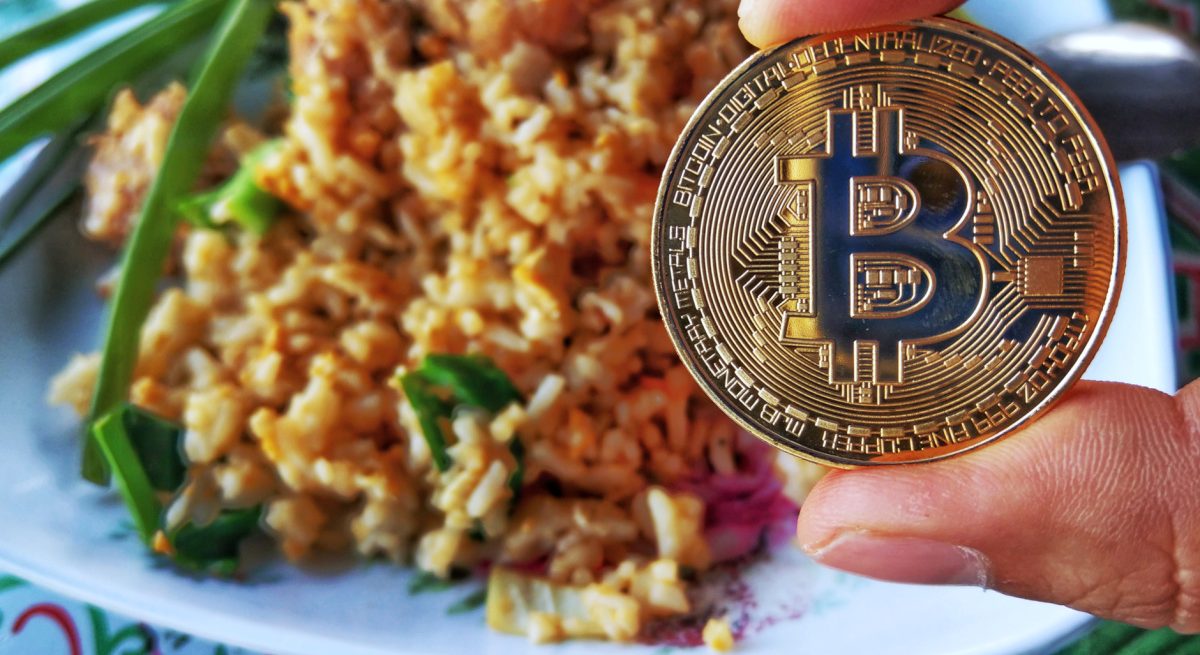What Are Crytpo Restaurants Serving Up?
5 Min Read By Khyati Hooda
Cryptocurrency has real-world applications in the food industry, with restaurants using it to create new and exciting foods for their customers and find ways to use crypto as payments.
While high stock prices of crypto companies like Bitcoin grab headlines, they are gaining traction with consumers since blockchain technology helps make transactions easier without needing an intermediary such as a bank or credit card company.
Restaurants and hotels are playing their creative game too well as they establish crypto-themed restaurants across the globe.
Application of Blockchain in the Food Industry
Blockchain technology has been applied to the food industry. For example, IBM Trust is a collaborative network of growers, processors, and wholesalers who can track products as they move across the supply chain.
They have built their solution on IBM Blockchain, which connects all participants through a permissions record about food origins and processing data. Furthermore, it also improves food safety and minimizes waste; moreover, it will contribute directly to your bottom line, which has seen participation from Walmart and Nestle.
Covantis is a blockchain-powered digital operations platform that eliminates paper-based post-trade processes and increases efficiency, while decreasing operational risks for bulk commodity shipments.
Such advancement of technology in the food industry expanded into the use of cryptocurrency in the restaurant industry, leading to the rise of crypto restaurants taking their place in the blockchain world.
Examples of Crypto Restaurants in the US
Restaurateurs and hotel owners have been playing their creative game too well and they’ve created a crypto-theme restaurants across the globe.
There are restaurants that accept cryptocurrency as payment and cafes with dishes named after some of the top cryptocurrencies on their menu.
1. Starbucks
Bakkt, a US-based futures trading platform for cryptocurrencies, announced plans in August to collaborate with Starbucks. The coffeehouse chain will become one of Bakkt's flagship retailers and embrace crypto through its payment app.
As well as this, the company also announced it would unveil its payment app soon! Crypto has not made up a big portion of Starbucks' overall sales, but this collaboration is significant nonetheless.
2. Quiznos
Quiznos accepts Bitcoin payments for its sandwiches and other offerings. Quiznos teamed up with digital asset provider Bakkt to allow customers to pay in Bitcoin. After announcing the partnership, the company ran a pilot program in outlets in Denver this month.
3. Piya
Bee, the celebrity chef who opened Miami’s Oishi Thai restaurant back in 2005 is preparing to launch Miami’s first NFT restaurant. Piya has no confirmed locations, but it will have a private omakase dining room and a fast-casual area where NFT holders can access exclusive events.
4. Camboflare
To give customers more options for how they pay, the Asian fusion restaurant CamboFlare in Big Lake, Minnesota, is now accepting payments by cash, credit card, and major cryptocurrencies.
Camboflare is one of the very few restaurants in Minnesota that does this. Some of these include bitcoin cash and Dogecoin. When it opened up in November 2020, it only accepted bitcoin as payment, but now there are several other ways you can do so, including Ethereum, among others.
5. Flyfish Club
Flyfish Club is the first private dining club set to open early next year in New York City. Here, members join by buying a nonfungible token (NFT), which is a certificate of authenticity using a distinctive string of characters in connection to a blockchain.
Memberships or the Flyfish token at this club sell for 2.5 Ethereum which is about $7,557 today. On the other hand, the Omakase token, which gives members exclusive access to the club’s other unique facilities, sells for 4.25 Ethereum or $12,847 today. They are currently sold out.
6. La Sirene
La Sirene accepts more than twelve cryptocurrencies as payment-such as Bitcoin and Uniswap tokens. La Sirene is a New York restaurant that offers its visitors the chance to enjoy modern French cuisine. La Sirene, in particular, gets inspiration from Southern France's culinary dishes.
At La Sirene, you can pay with Cardano, Ethereum or Neo, and even Monero. In essence, this spot provides an excellent opportunity for crypto investors who want some French flavors while they're on their way around New York City.
Advantages of Using Blockchain in Restaurants
Blockchain for restaurants may prove to be game-changing regarding efficiency, security, and transparency. These systems can transform how business is conducted by streamlining operations and reducing fees.
Cryptocurrency should not be overlooked in this digital age since it is an integral part of these transformative technologies.
1. Easy transactions
Decentralization in cryptocurrencies is the reason for their increased speed and efficiency. No third party, like a bank, is needed to approve or deny transactions; instead, nodes (computers from various locations) that process transactions on the network run an algorithm to confirm and approve them.
These transactions are then stored as new blocks on a chain containing data that cannot be revised without the agreement of all nodes.
Transactions in a blockchain ledger cannot be refunded unless by the entity that received the payment. This is why transactions in blockchain—like Bitcoin—are considered immutable.
2. Authentic ratings
For both restaurants and consumers, false reviews are a problem. It is difficult to tell if any said review is truthful or fabricated to help or harm an institution when anyone can publish them without authenticating their name.
Consumers and restaurants can't add or remove reviews to clean up bad ones – all of these decisions have been made above board! Businesses want to offer reviewers a cryptocurrency token for their written reviews. This will ensure that ratings are not changed, as it's held on the blockchain and cannot be tampered with.
3. Innovative Loyalty Schemes
Blockchain technology can allow companies to offer loyalty schemes. Loyalty points are in production by large chains and small independent firms that go outside their doors, which will cause new attention from buyers.
4. Enhancing customer experience
Blockchain modules in restaurants share with customers the origin and journey of ingredients. It produces brand loyalty around ingredient consistency, protection, sustainability, and sourcing. In addition, it connects diners with information about their food- where it is from and its preparation.
5. End-to-End Supply Chain Visibility
The Trace module that uses blockchain is a way to see the end-to-end supply chain. It decreases the amount of time taken from days to mere seconds, meaning you can track food sources faster. Knowing where ingredients come from and their status proves significant in the case of a food-borne disease epidemic when you can respond rapidly and confidently with recalls that prevent expensive harm to reputation and needless waste.
6. Lower fees per transaction
Lower fees per transaction can also benefit from cryptocurrency for restaurants, depending on the platform or system used to process the transaction. Bitcoin and other cryptocurrencies have lower fees than fiat currencies because crypto-transactions are typically based on data amount rather than price.
With relatively low fees of 10 to 20 cents for Bitcoin and about 2 cents for Litecoin, restaurants can afford offers compared with the two to three percent that credit card transactions charge.
7. Marketing and publicity
A good marketing strategy is important for any business. If you want to stand out in the sea of businesses, it is a good idea to post a notice that your business accepts Bitcoin. This point of interest can help draw attention and bring in potential customers who have expendable income. Since this demographic has grown up with digital currencies, they are more likely to appreciate such information on storefronts or online advertisements than other demographics might be.
Chef-owners are adding physical and digital signage in their restaurants, declaring that they accept cryptocurrency. This is a unique selling point for them as well as publicity to advertise which restaurant has the cuisine you're craving after. Restaurateurs use promotional materials such as signs or flyers to differentiate themselves from other nearby establishments so users know what menu items are offered at each location.
Bottom Line
Bitcoin, which was introduced in 2008, has come a long way. Plenty of companies and enthusiasts have worked to make it easier for us to use bitcoin in our everyday lives. Businesses may need to buy the software to accept Bitcoin or other cryptocurrencies like it, but the infrastructure for these transactions is already in place. There are a few advantages to accepting bitcoin at your restaurant or café- it attracts like-minded and pro-cryptocurrency clientele. It also gives your customers more payment options by allowing them to use cryptocurrency or traditional currencies.
Even if they don't know what bitcoin is, they might appreciate the many choices of payment that you offer. However, before bitcoin becomes commonplace on Main Street we need more stability-it doesn't take much effort for someone who accepts bitcoin but you may be waiting a while before that customer pays with cryptocurrency.


